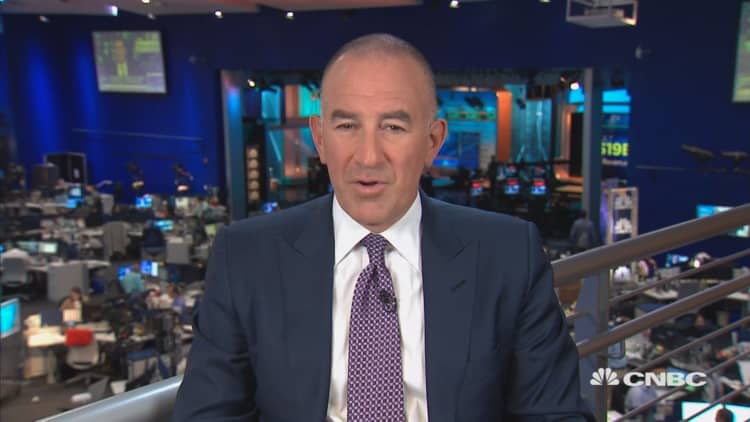A new federal regulation aimed at providing increased investor protection isn't slated to go into effect until later this year.
But a fight is already brewing in one state — Massachusetts — over the potential enforcement of a stronger rule.
The Securities and Exchange Commission's new rule, called Regulation Best Interest, went into effect in September of last year. But firms have until June 30 of this year to comply with the rule.
As its name implies, Regulation Best Interest — "Reg BI," for short — requires brokers to keep their clients' best interests in mind when recommending securities. It also requires additional disclosures outlining the terms of the relationship be presented to clients.
But the SEC rule was met with critics, including William Galvin, Massachusetts secretary of the commonwealth, who said that Reg BI did not go far enough.
In an August 2018 letter to the SEC, Galvin said the best-interest standard "will foster confusion and will fail to protect vulnerable investors."
Instead, Galvin said a uniform fiduciary rule, which would require both broker-dealers and investment advisors to put clients' interests first, would be preferable. Currently, broker-dealers answer to what is called a "suitability rule." That means their recommendations must be suitable for clients. Investment advisors, on the other hand, are already held to a fiduciary standard.
The SEC has the authorization to come up with a uniform fiduciary standard under a 2010 law called the Dodd-Frank Wall Street Reform and Consumer Protection Act.

Last summer, Galvin took matters into his own hands and proposed creating a uniform fiduciary rule in Massachusetts.
He also opened the proposal for public comment, which drew sharp criticism from the industry and praise from consumer advocates.
At a Massachusetts Securities Division hearing on the issue this week, those two sides largely held to their positions.
Why critics disagree with the rule
Among the rule's critics are the Insured Retirement Institute, an industry advocacy group representing broker-dealers, and the Financial Services Institute, which represents independent broker-dealers and financial advisors.
What IRI hopes to see is for regulators to give Reg BI a chance before putting other new requirements in place, according to Jason Berkowitz, chief legal and regulatory affairs officer.
The group sees negative consequences for individual investors with Massachusetts' rule, namely a decrease in their ability to access brokerage services.
That's because the IRI believes the move would make it more difficult for broker-dealers to operate in the state, which could prompt them to scale back their offerings or discontinue their operations there.
Consequently, individual investors would have fewer choices, Berkowitz said. Existing clients with a sufficient level of assets could be forced into advisory accounts, he said, while those who don't meet those minimums may be left without access to professional financial advice.
Why advocates want the change
Knut Rostad, president of the Institute for the Fiduciary Standard, said the state fiduciary rule would improve, rather than limit, the investments firms make available to individuals.
"It will prevent them from providing inferior-quality, opaque products that are very difficult to understand," Rostad said. "But it will not prevent them from providing products that are far less expensive and valuable."
Other advocates for consumers also applauded the state's effort.
That included AARP Massachusetts, which advocates for consumers on issues including financial security.
More from Personal Finance:
Why consumer protections didn't improve as expected in past decade
Here's how the new retirement legislation could fall short
How the Affordable Care Act transformed our health-care system
In a comment letter dated Jan. 7, the group, which represents approximately 800,000 members, said that broker-dealers often confuse individual investors because they hold themselves out as financial advisors.
And not knowing the difference between how those financial professionals operate can cost consumers, AARP Massachusetts argued. Consumers can end up paying higher fees than necessary or investing in underperforming investments.
"In the absence of a uniform fiduciary standard, conflicted advice costs Americans $17 billion in foregone retirement earnings every year," AARP Massachusetts explained in its letter.
What to watch for next
Despite the criticism Massachusetts' proposed rule has received from the industry, Rostad said he expects to see the state continue to move forward with the regulation. Meanwhile, business groups have asked for an extended comment period.
A handful of other states could proceed with efforts to come up with their own fiduciary rules. That includes New Jersey, which has a proposal pending under state administrative rules, as well as Nevada and Maryland.
Meanwhile, the Department of Labor is expected to release a new fiduciary proposal in the next few weeks, according to Berkowitz. The DOL previously had its own fiduciary proposal under President Barack Obama's administration, which was subsequently killed under the current administration.
The DOL's new proposal is expected to take the SEC's new regulation into account, though the industry is waiting for more details. "It's hard to anticipate exactly in which direction it will go," Berkowitz said.


